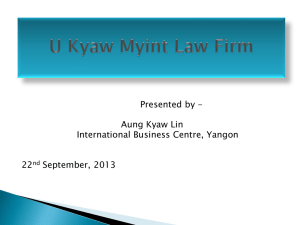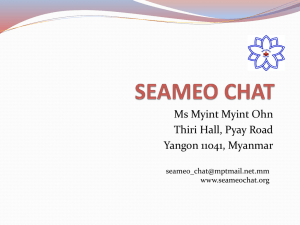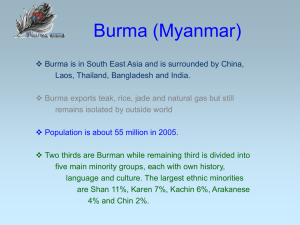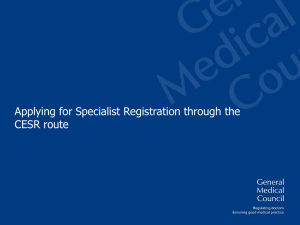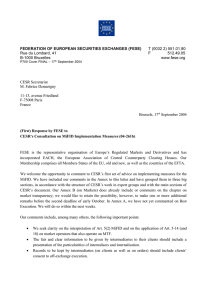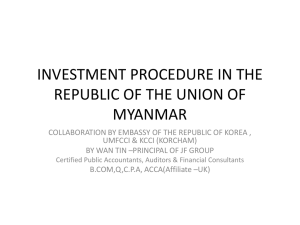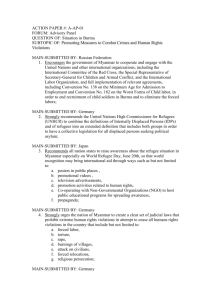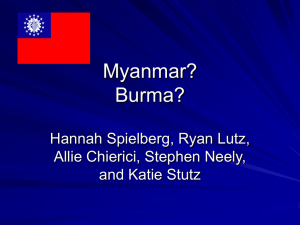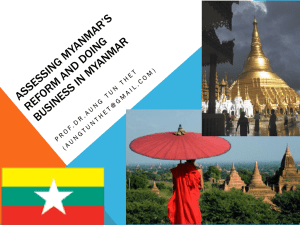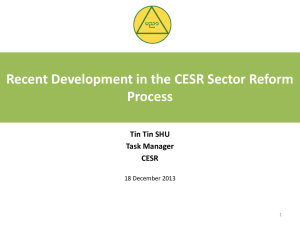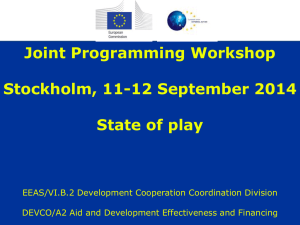A. Kyaw Thein - The Training Gateway
advertisement
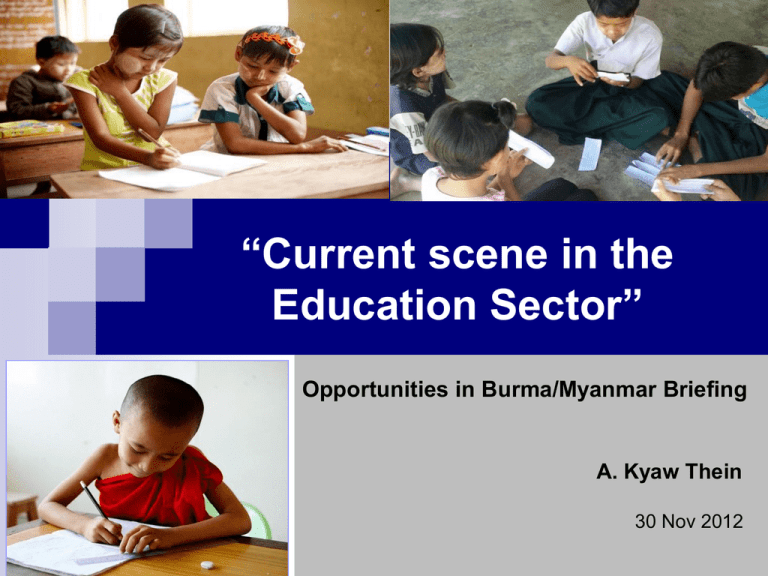
“Current scene in the Education Sector” Opportunities in Burma/Myanmar Briefing A. Kyaw Thein 30 Nov 2012 Cautious Optimism Rapid Political & Economic reform Socio-political issues Conflict resolution and protection of human rights. Constitutional reform Democratic constitution Decentralized legislation power and Ethnic rights Obama Speech at Yangon University Historical Background High literacy rate with 89.9 % of adults and 94.5 % of youth considered literate (UNESCO 2007) Asian Example Used for political objective - foster resistance to encroachments of Western and Asian imperialism 88 student-led demonstration Military regime crashed down Education Slow and steady decay Myanmar Education System Education School Level Primary Elementary Grade Age Years 1-5 6-11 5 6-9 12-16 4 10-12 17-18 2 Education Middle Intermediate School Secondary Secondary Education Tertiary Tertiary- Higher Education 2 Over 170 Universities I. Main II. States and Regions Health III. IV. Medical Dental Public Health Traditional Veterinary Science Technology Engineering Aerospace Engineering Computer Science Defend Services Academy V. Religion VI. Defence Technology Nursing and Paramedical Theological Colleges Buddhism Other Specialisations Economics Forest Agriculture Education College Foreign language Ministry of Education 1. 2. 3. 4. 5. Department of Higher Education Department of Basic Education Department of Myanmar Language Commission Department of Myanmar Board of Examinations Myanmar Educational Research Bureau (MERB) Key Issues in Education Sector Highly central control and complex management under Different Ministries Lack of coordination – across the sectors among Universities between Basic and Higher Outdated policy and resources Lack of teaching and learning resources – library Lack of an adequate budget – increase to 4 % though limited reach and access Gender disparity Capacity and other technical issues – competency Exams- based, Class room-based Activities Highlights Policy advocacy work Child Centred Education Unicef, JICA, Pyoe Pin, etc Networking and Clusters English Language and other capacity Building Parliament Civil Society actors Donors efforts Research British Council, Unicef, etc. Ethnic language policy work Media Comprehensive Education Sector Review Opportunities Increased budget from 1% to 4 % Parliament Institutions - rejected Higher Education Bill in Aug 2012 Individuals - Aung San Suu Kyi and most MPs National priority interest –EFA Goal Coordination mechanism –Government, Donors, Civil Society- Parliament Research interests Myanmar Research Development Institute (MRDI Other sectorial research networks U Myint (President Economics Policy Advisor) Comprehensive Education Sector Review ‘It is in education in particular that I hope the British can play a major role. We need short-term results, so that our people may see that democratisation has a tangible, positive impact on their lives’ ‘Vocational training and creation of employment opportunities to help address Burma ’s chronic youth unemployment are particularly important’ Access and freedom ‘Such a system was not suitable for a democratic country and called for independence to be enshrined in Burma’s higher education institutes… ‘University is a place where students should have freedom to create their dreams and speak out about what they believe …too many young people did not get the chance to study’ Aung San Suu Kyu Draft New Bill “The new draft that we are going to write will be similar to the education system in 1920, which was used at Rangoon University. We may have a good education system after review and development from the current draft,” Ba Shein Member of Parliamnet Inclusive policy reform ‘Teachers and education experts must be involved in the drafting process’ Thein Nyunt, Member of Parliament Independent Education System ‘Education system there must be autonomy at universities with the right for each to make their own decisions. The government should only establish one national policy without controlling individual universities’ Kyaw Zaw Naing. Creative Thinking ‘The current system is failing because so many schools have been shut down… students must not just be forced to read but instead encouraged to develop cognitive and creative skills’ Myint Myint Khin, former professor Rangoon Medical School Comprehensive Education Sector Review (CESR) Task Promotes a ‘learning society capable of facing the challenges of the Knowledge Age’ Help build ‘a modern developed nation through education’ Objectives Develop a knowledge-base and identify areas for reform; Support evidence-based policies, legislation and education sector improvements Develop costed education sector plans Phases of the CESR Phase 1: Rapid Assessment: (6 months) Identify urgent priorities and reform issues Knowledge gaps for second stage. By early 2013 Phase 2: In-depth Analysis: (1 year) In-depth sector analysis -investigations and capacity building By December 2013 Phase 3: Development of Education Sector Plan: (6 months) Education sector plan (mid 2014). Initial two year plan (2014-2016) Five year plan (2016-2021) Assessment Phase 1: Focus Basic Education Early childhood Primary education Secondary education Non-formal education Teacher education Policy, legislation and management -Higher Education Financing Coordination mechanisms Textbook Management System of CESR CESR Steering Committee Patron: Union Minister for Education Chair: Deputy Union Minister for Education CESR Task Force Chair: Deputy Union Minister for Education Secretary: Director General Joint Education Sector Working Group (JESWG) Chair: Co Chair: Director General UNICEF, AusAID CESR Office Chief Technical Advisor International Coordinator National Coordinator Task Managers Technical Teams International Consultants National Consultants Focal Persons Development Partner Coordination Mechanism Qs & As Please !
